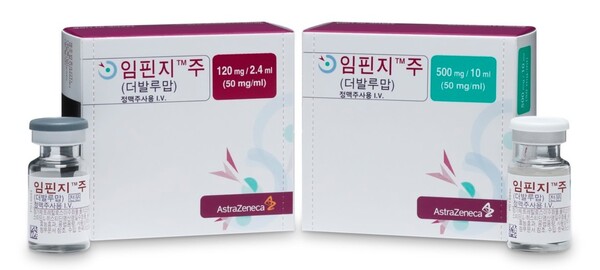Starting next month, biliary tract cancer patients can add the anti-PD-L1 immunotherapy Imfinzi (durvalumab) at their own expense to the existing gemcitabine/cisplatin (GemCis) chemotherapy regimen for the first-line treatment of locally progressive or metastatic biliary tract cancer.
It was part of the changed reimbursement criteria for chemotherapy for major cancer types in the recent public notice by the Health Insurance Review and Assessment Service (HIRA).

Specifically, when GemCis is administered in combination with Imfinzi in first-line treatment, GemCis will be reimbursed on a co-payment basis (5/100), and Imfinzi will be used completely at patients’ own expense (100/100) (histologically limited to adenocarcinoma with ampullar of vater cancer excluded).
In November 2022, AstraZeneca received approval for the combination of Imfinzi + GemCis from the Ministry of Food and Drug Safety and attempted to enter the reimbursement system the following year. However, the attempt fell through after failing to pass the Cancer Disease Review Committee, the first gateway to reimbursement.
At the time, however, the committee recognized GemCis in combination with Imfinzi on a partial "co-payment" basis.
Until now, when patients have used the Imfinzi + GemCis combination on a non-reimbursement basis, the previously covered GemCis therapy has also been converted to a non-coverage basis, limiting patients' treatment options.
To use Imfinzi, patients have had to pay for existing chemotherapy, so unless they had private insurance, they had no choice but to abandon immuno-oncology treatment even though they knew it was effective.
Cancer experts have long pointed out this problem as the use of immuno-oncology drugs expanded in Korea.
Except for a few cancers where targeted therapy has become the standard of care, adding immuno-oncology to existing chemotherapy has improved effectiveness without significantly increasing side effects in many cancers.
In addition to biliary tract cancer, immuno-oncology drugs are already licensed and used in combination with conventional chemotherapy for lung, head and neck, stomach, breast, and cervical cancers, and all of them face the same problems before reimbursement.
Therefore, the Korean Cancer Society and other associations ask the government to "amend the law so that when immuno-oncology drugs are licensed in combination with chemotherapy, which is already used as a standard therapy, the existing chemotherapy benefits are maintained and only the newly added immuno-oncology drugs can be used at the patient's own expense.”
However, some argue that it will be difficult to authorize off-label use immediately after approval without a reimbursement review.
Since combining immuno-oncology drugs with chemotherapy improves the survival time of patients and increases the duration of chemotherapy, the government can't approve it without assessing their financial impacts.
Yet others are concerned that the reimbursement timing of immuno-oncology combinations will be delayed, starting with biliary tract cancer.
Under the new rule, upon receiving requests for reimbursing immune-oncology combination therapy, the cancer review panel can make patients pay full expenses, earning more time.
All this explains why industry insiders pay attention to whether using Imfinzi in biliary tract cancer will lead to expanded access to immuno-oncology combination therapies or produce the opposite result, pharmaceutical sources said.
Related articles
- BeiGene applies for insurance benefits for esophageal cancer drug Tevimbra
- Handok's Vyxeos, Gilead's Trodelvy pass cancer drug review for insurance coverage
- [ESMO 2023] ‘HLB will apply for European authorization for rivoceranib this year’
- AstraZeneca vows to remove ‘cancer’ from the world’s leading cause of death
- Korea's health insurance panel denies coverage for new cancer drugs
- New treatments for biliary tract cancer remain elusive for Korean patients
- Korean and foreign experts jointly tackle threats of pancreatic and biliary disease

